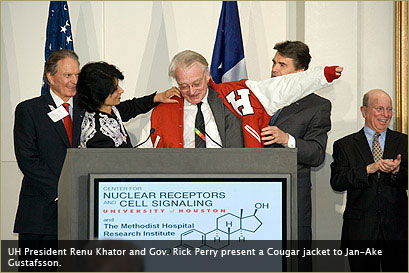
By Richard Bonnin
UH Communications
Gov. Rick Perry announced last week the awarding of a $5.5 million grant to the University of Houston through the Texas Emerging Technology Fund (ETF).
As a result of the ETF grant, UH has recruited a top hormones researcher and his team to carry out laboratory research and to create next-generation pharmaceuticals and medical technologies at a world-class center to be established by UH and The Methodist Hospital Research Institute (TMHRI).
"This world-class research team will lead the charge in developing treatments for diseases that plague our citizens and enhance the University of Houston’s presence as a biomedical research institution," Perry said.
Jan-Ake Gustafsson, a renowned figure in the study of hormones and a member of both the National Academy of Sciences and the Nobel Assembly, accepted an appointment this summer to expand his revolutionary research efforts at the University of Houston. He arrived on campus in late January.
"We are delighted to have Dr. Gustafsson join our faculty as a key leader in our biomedical initiative," said UH President Renu Khator. "He was courted by Ivy League institutions and determined the University of Houston offered the best opportunity to advance his research. He will play an important role in our quest for flagship university status."
Gustafsson, who holds both a Ph.D. and M.D., will teach as a distinguished professor at both the department of biology and biochemistry and the department of chemistry at the College of Natural Sciences and Mathematics. Gustafsson also will be a distinguished member of TMHRI and will head the proposed Center for Nuclear Receptors and Cell Signaling, a collaborative effort between UH and TMHRI.
Gustafsson said he looks forward to building a state-of-the-art research center, focusing on "the medically very important field of nuclear receptors and cell signaling."
"The concentration of outstanding scientists at UH, TMHRI and in the Houston area in general, including the medical center, provides unique possibilities for cutting-edge translational research with great clinical and commercial potential," he said.
Gustafsson is revered worldwide for his translational research on nuclear receptors, a class of proteins found in cell nuclei that capture hormone molecules and interact with and control the expression of genes. Research in this field is vital in developing treatments for such diseases as cancer and diabetes.
Here’s how nuclear receptors work: Each receptor in the cell’s nucleus has a cavity shaped just so that a hormone molecule can fit inside. Once wedded to the hormone, the nuclear receptor’s outer surface changes, depending upon the type of hormone housed within. Then, other proteins recognize the receptor’s surface structure and join in a chain reaction. This hormone-controlled process influences expression of genetic information and the development and metabolism of an organism.
Gustafsson’s research group at the Karolinska Institute in Stockholm, Sweden, in the mid-1990s discovered the existence of a previously unknown estrogen receptor that plays a pivotal role in the function of the brain, lungs and immune system. Today, drugs are being developed to stimulate that receptor, named ER-beta, to battle a number of diseases, including breast, prostate and lung cancers. (In some instances, the abnormal cell division that creates cancerous tumors can be slowed down or stopped by stimulating the receptor.)
Gustafsson’s work on other nuclear hormone receptors lends itself to new treatments for metabolic syndrome, including atherosclerosis, Type 2 diabetes and nonalcoholic hepatic steatosis, also known as fatty liver. He also has found evidence that the roles played by estrogen receptors and nuclear hormone receptors in the brain may be manipulated to treat neurodegeneration, Parkinson’s disease, Lou Gehrig’s disease, depression and other mood disorders.
Among his many honors, Gustafsson is a member of the Swedish Academy of Sciences and winner of the Svedberg Prize in Chemistry, the Anders Jahre Prize of Oslo and the Soderberg Prize in Medicine.
He is director of the Center for Biotechnology at Huddinge University Hospital at the Karolinska Institute, and he has been an adjunct full professor at Baylor College of Medicine in Houston since 1987. |

